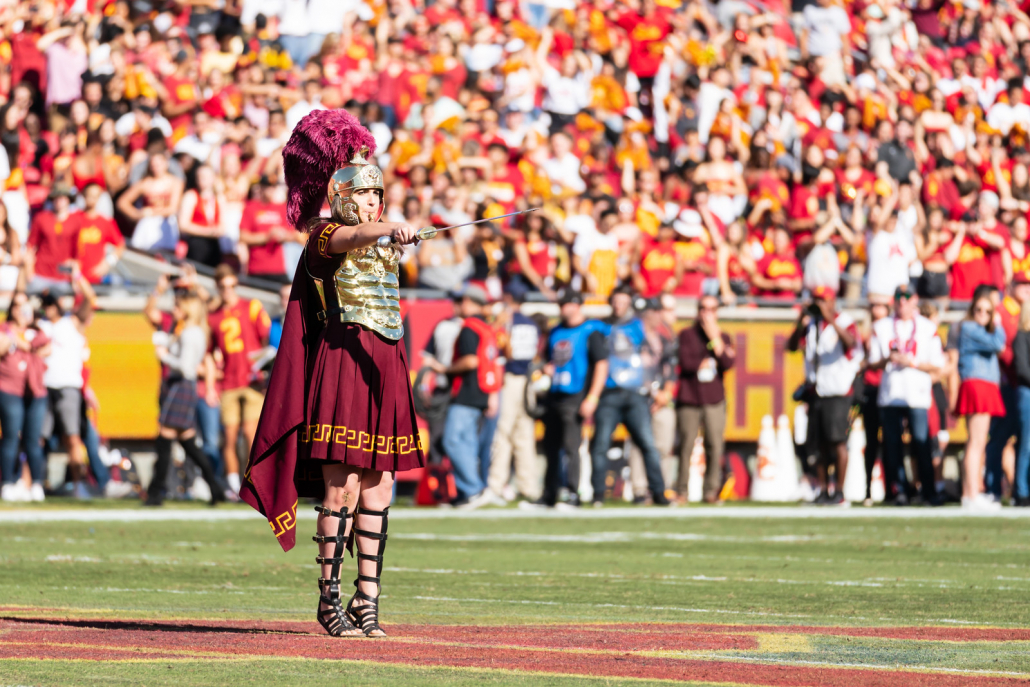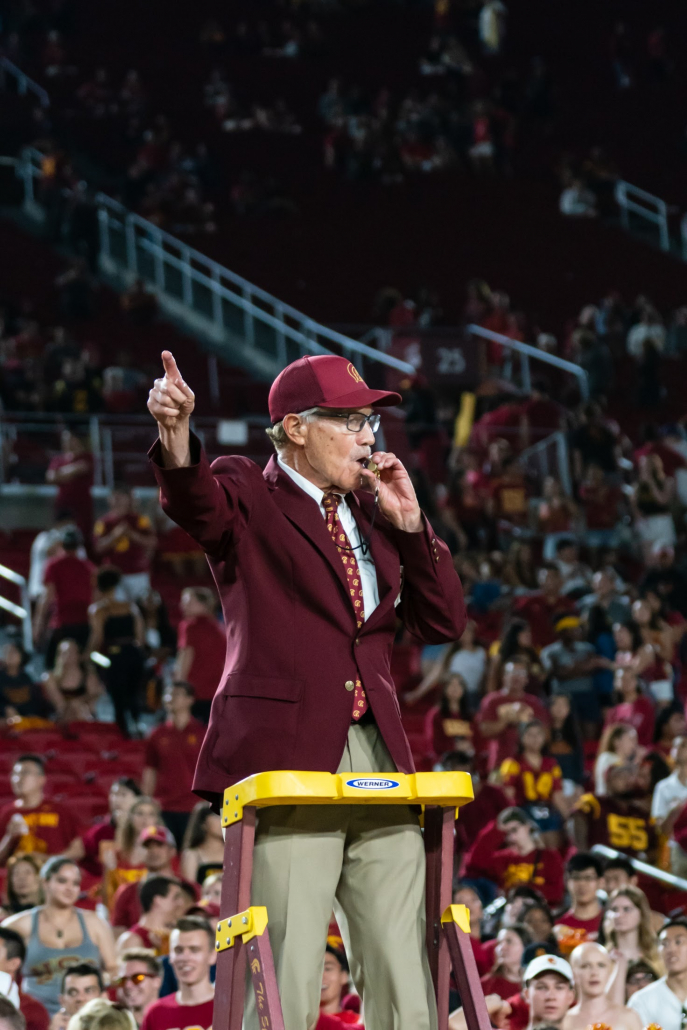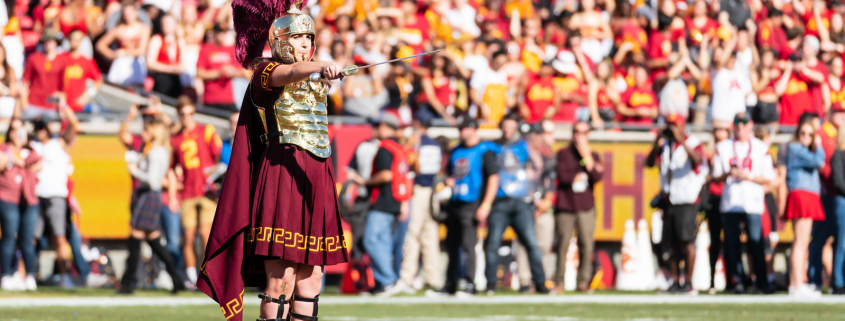Gamedays like no other

Typically at this time of year, most discussions about USC’s football team revolve around familiar subjects: Who will be the starting quarterback? How much depth do the Trojans have at running back? How is the team going to fare in conference play?
This year, however, only one question really matters, and fans still have no answer to it: Will there be a college football season at all?
“It is true that, at this time, we do not have state, county, or university clearance for traditional practices and competitions,” Athletic Director Mike Bohn wrote July 31 in a letter to donors obtained by the Daily Trojan. “Additionally, we have not received any indication about if fans will be permitted to attend home games at the Coliseum this year should the season go forward, and we do not have any timeline for when this decision would be made by public health officials.”
Despite having months to prepare and organize a season, the fate of 2020 college football remains completely up in the air, subject to the unpredictable spread of the coronavirus and the whims of government, NCAA and university officials. This means that gameday experiences unlike any in the history of USC football are approaching — potentially without fans, marching bands or tailgating.
In light of the circumstances, Roy Nwaisser, a USC alumnus who has famously not missed a USC football game in 27 years — earning him the moniker ‘USC Psycho’ — believes his typical gameday routine of tailgating might no longer be possible.
“As long as [the coronavirus] is a threat, I don’t know that I will be tailgating at all,” Nwaisser said. “Traditionally when we have tailgates, everyone is in close quarters, we’re eating food, we’re sharing food off of the same table, people are sticking their hands in the same chip dish [and] cooler and pulling out drinks. You really can’t do any of that if you’re social distancing … I’m certainly not going to be turning my tailgate into a COVID party.”
When asked about the prospect of his 27-year attendance streak ending, Nwaisser was less pessimistic, albeit for a different reason.
“If I miss a game that I choose to miss, then that would be the end of the streak,” Nwaisser said. “But if it’s there is a situation where there is no way to get in because fans aren’t allowed in or there’s just not an availability of tickets or it’s totally out of [my] control, then I don’t think that kills the streak.”
Though his famous run might survive another season, Nwaisser acknowledged that a season restricted to TV screens will be irredeemably lacking the qualities that make the college gameday experience so special.
“For me, there is still nothing like college football,” Nwaisser said. “I love the atmosphere. I love the band. I love the action. It’s just not the same on TV.”
Devin Dhaliwal, a junior at USC and lifelong Trojan football fan, shared Nwaisser’s sentiment.
“From an entertainment and passion perspective, there is nothing that beats college football because you have [students], alumni who have attended the school and graduated and you have the bands, the different fight songs and traditions [and] tailgating throughout campus,” Dhaliwal said. “I think college football just has such a unique energy to it.”
Dhaliwal, who grew up attending USC games with his father, a Trojan alumnus, has recently enjoyed a gameday experience far different from the ones that most fans do. Since joining USC’s marching band, Dhaliwal has gained an appreciation for how much the band contributes to the energy and tradition of gamedays at the Coliseum.
“We’re there every game from start to finish,” said Dhaliwal, who is majoring in computer science and business administration. “We’re really trying to be positive and support the team as much as we can, and I think by doing that, it sort of sets an example for the rest of the student body and the rest of the stadium to say, ‘Hey, we’re here and we’re going to support our team no matter what happens.’”
Apparently, Dhaliwal is not the only Trojan fan who holds this opinion.
“I love the band,” Nwaisser said. “I’ve always said, even when the team’s doing horribly, the band still rocks.”
Considering the risks presented by the pandemic and the likelihood that both University Park and the Coliseum will be largely vacant, Dhaliwal has opted to stay home for the fall semester.
The sense of loss that a missed season will bring is apparent to him.
“It’s going to be a huge void because that’s something I’ve grown up with my whole life, something I really look forward to sharing with my friends and my family, and it’s not going to be the same, which sucks,” Dhaliwal said.
Nwaisser, for his part, maintained that he would try to travel to games if possible, but he is still wary of the public health crisis.
“If things don’t change for the better, I would not feel comfortable [traveling],” Nwaisser said. “But I would do it. The question is will I fly or will I drive. I don’t like the idea of driving to Washington, but I think I don’t like the idea of flying to Washington — with crowded airports and crowded airplanes — even more.”
On the other hand, Charles Myers, a USC alumnus and former season-ticket holder of more than 20 years, is more steadfast in his unwillingness to attend games in person.
“No,” Myers said. “You’re asking me if I’m going to risk the health of my family for the sake of attending a football game — sorry, no.”
Though Dhaliwal will miss gamedays at the coliseum alongside his fellow band members, the band — led for the 51st straight year by Dr. Arthur C. Bartner — is forging ahead and preparing for the season, no matter what it will look like.
“If it’s all virtual, it’s all virtual,” Bartner said. “If we can get some kids on campus, that would be great too. But, as you know, some kids are not coming back to campus, so we’re trying to come up with a curriculum where we can go both in-person and virtual.”
Since the coronavirus outbreak, Bartner’s band has been forced to become flexible in its recruitment and preparation.

Typically, the band recruits approximately 100 new members during summer orientation sessions. This summer, the band has successfully recruited about 70 new members during online sessions. In addition, much of the band’s equipment, such as instruments and uniforms, remains inaccessible.
Still, despite the challenges, Bartner believes that his band members are unwavering in their commitment.
“What I hear from my recruitment team is that these kids love this band,” Bartner said. “I’m hearing ‘I’m coming back’ or ‘I’m going to join this band … whatever they throw at us, whatever the scenario is, I want to be a part of this band.’”
Because of the length of his tenure at the helm of The Greatest Marching Band In the History of the Universe, Bartner has witnessed first-hand nearly every big-game and time-honored tradition USC football has had to offer.
But there is one tradition that Bartner will miss most of all if the band is not allowed to perform at games.
“When we win and the team comes over to the band and we got the rooting section behind us and we play Conquest and we get the player of the game on the ladder and he holds the sword up … that is my favorite moment,” Bartner said. “You got the team, you got the band, you got the rooting section, the Song Girls, the spirit squad and then you got any fan who wants to come over … For a minute and 45 seconds of Conquest you have the Trojan Family all together.”
That sense of unity at Coliseum gamedays isn’t just felt by the marching band’s iconic leader.
“College is different,” Myers said. “There’s a sense of tradition … but also fellowship that just isn’t the same in professional sports or any venue in college sports.”
Myers was pessimistic about how fanless games might affect the environment at the Coliseum.
“It severs the emotional experience of the nostalgia, the walking the streets, the running into people that you haven’t seen in years or you haven’t seen since last year,” Myers said. “[I had] season tickets for 20 years [and] I’d look behind me, in front of me, on both sides and saw people and watched them get older with me and talk about our kids growing up. You’d lose the heart and soul of [the experience] and it becomes just a game.”
Bartner is still waiting on word from USC’s leadership as to whether or not his band can perform in the Coliseum and at what capacity. According to Bartner, the number of band members allowed to perform at games might be cut by 90%, from 300 performers to 30. Dhaliwal said this reality, combined with no pregame or halftime show, might make football games feel more like basketball games for the band.
Given the uncertainty, Bartner insists on preparing the band not only for the upcoming season but for when a new band director is selected to replace him after his upcoming retirement.
“I want [the band] to continue to be great [so] that when the new director takes over he’ll have this great band to work with,” Bartner said. “So I’m doing what I can to keep everybody involved and keep [everyone] progressing and improving, and I keep telling everybody that someday we’re going to march pregame … We don’t know when it’s going to happen, but we have to be prepared.”
Bartner reflected that sense of perseverance when he discussed his outlook on the Trojans’ future.
“This is a great university,” Bartner said. “[We’ve] got a great student body, and we’ve got a terrific band … and we’re going to Fight On. I’m a believer in Fighting On, and we’re going to get through this pandemic and come out stronger on the other end and we’re going to win a ton of football games.”
After all, Bartner may be right. But for now, he and USC football fans can only hope for the best — and they may need to adjust to a gameday experience quite unlike anything they’ve ever seen.
Nathan Ackerman contributed to the story.
Note: This article was written prior to the postponement of Pac-12 sports through 2020.

